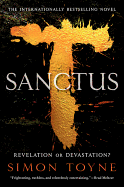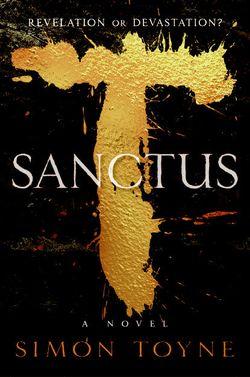
 Dan Brown didn't invent the thriller that promises to blow your mind by explaining that everything you knew about religious history was a lie, but The Da Vinci Code has become the benchmark for the genre, and novels like Sanctus will inevitably be forced into comparison with it. In some respects, debut novelist Simon Toyne strives to surpass Dan Brown: while The Da Vinci Code was content to throw the origins of Christianity into doubt, Sanctus posits a brutal conspiracy that stretches back to the dawn of civilization and continues to hide its mysterious "Sacrament" deep inside the Citadel, a monastery carved into a mountain on the outskirts of Ruin, a Turkish city that has the distinction of being the oldest inhabited location on the planet.
Dan Brown didn't invent the thriller that promises to blow your mind by explaining that everything you knew about religious history was a lie, but The Da Vinci Code has become the benchmark for the genre, and novels like Sanctus will inevitably be forced into comparison with it. In some respects, debut novelist Simon Toyne strives to surpass Dan Brown: while The Da Vinci Code was content to throw the origins of Christianity into doubt, Sanctus posits a brutal conspiracy that stretches back to the dawn of civilization and continues to hide its mysterious "Sacrament" deep inside the Citadel, a monastery carved into a mountain on the outskirts of Ruin, a Turkish city that has the distinction of being the oldest inhabited location on the planet.
The opening of the novel is impressively spectacular: one of the monks has just discovered the truth about the Sacrament and, having handled the news poorly, has been scheduled for execution. Instead, he breaks out of his cell and climbs to the top of the Citadel, where he poses like a crucified figure until international news networks broadcast his image all over the world, at which point he hurtles himself to the ground below. But... was he really mimicking Jesus on the cross, or was he depicting the Greek letter tau, the origins of which stretched all the way back to the ancient Sumerians?
This is exciting stuff, especially when you throw in an intrepid Turkish police inspector, commando monks sent to recover their apostate brother's corpse, an ancient counter-conspiracy that sees his suicide as the first movement of a long-awaited prophecy, and his sister, a reporter for a New York City newspaper who immediately jumps on a plane to Ruin when she gets the first news of her brother in eight years. Toyne sets all these components in motion and never lets the pace falter, right up to the startling revelation.
But where Dan Brown carefully nurtures the plausibility of his alternative theologies by aligning many of his key narrative details with the world as we already know it--both past and present--Toyne vaults into pure fantasy. It's not just that neither Ruin nor the Citadel exists; the religious order guarding the Sacrament is clearly intended to be disguised as a Christian order, yet seems to have a tangential at best connection to any Christian institution we would recognize. That might make sense, if you figure they're supposed to be the secret power behind Christianity, but then it turns out they're also the secret power behind Judaism, too, which seriously muddies the historical picture. (Also, they've managed to suppress just about every copy ever made of "the heretic Bible," but they haven't realized their ancient enemies have a base practically down the street?)
Despite these flaws in logic--as well as an ending that isn't really an ending--Sanctus can be awfully fun if you give yourself over to the ride. The non-realistic aspects of the story mean it's not likely to spark the sorts of debate Dan Brown's fiction can, but it reads as though Toyne's real focus may not be on theological revolution so much as sheer entertainment, and on that front his career is off to a rollicking start. --Ron Hogan
Shelf Talker: Subtly feminist critique of patriarchal religion or escapist thriller? You be the judge.

